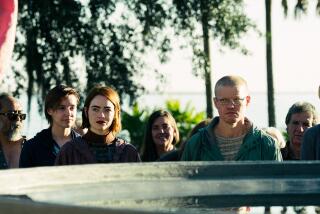Review: ‘The Lobster’ offers a rich, surreal take on modern love
- Share via
When the end credits roll in “The Lobster,” Yorgos Lanthimos’ hypnotically strange and suggestive new movie, you may find yourself scanning a bit more intently for the usual reassurance that no animals were harmed during production. There is, for starters, an arresting early scene in which a woman drives out to a remote field and puts three bullets in a donkey’s brain. Sometime later, a rabbit is caught in a trap and presented to a lover as a gift. And in between, there is one act of animal cruelty so chillingly unmotivated, you might be reminded of one of those haunted-house freakouts where it doesn’t pay to get too attached to the family pet.
As it happens, “The Lobster” is very much its own brand of horror movie, as well as a deranged thought experiment, a stealth love story, and a witty dismantling of the usual barriers separating man from beast. I mean that last part quite literally. Lanthimos (who wrote the screenplay with his regular collaborator Efthymis Filippou) has imagined a curious dystopian parable in which society is divided between the romantic haves and have-nots, and those who fail to land a spouse within a designated time frame are transformed into animals and cast into the wild.
Our test subject for this procedure is David (a sublimely morose Colin Farrell), to whom we are introduced just as his wife is leaving him for another man. To remedy this sad situation he is sent to a countryside hotel, where he is questioned upon arrival about his sexual preference and the animal he would like to be turned into should he fail. (His answer and his astute rationale for it give the movie its title.) From that point on, David has 45 days to scour the premises for a proper mate, the criteria for which turn out to be highly specific to say the least.
It’s a wondrously silly premise, and one that Lanthimos, not unlike those great cine-surrealists Luis Buñuel and Charlie Kaufman before him, executes with rigorous illogic and immaculate formal control. He also operates with the straight-faced conviction that even his most fanciful conceits are no more absurd or arbitrary, really, than the accepted but always-evolving rites of modern courtship.
Much of the fun of “The Lobster” derives from figuring out those conceits, which are methodically unpacked by the hotel manager (a superb Olivia Colman), and elaborated upon by some of David’s fellow inmates, who approach their own conquests with varying degrees of calculation (Ben Whishaw) and cluelessness (John C. Reilly). And then there are those who forge their own destiny, like the hotel guest credited only as “Heartless Woman” (a terrifying Angeliki Papoulia), whom David unwisely latches onto as a potential soulmate.
In reimagining the dating game as a sort of endless work convention from hell, Lanthimos unapologetically takes aim at the cherished ideal of monogamous commitment, as well as the ingrained tyranny of any society that regards the single life with contempt or (worse) pity. Even in a time of unprecedented personal and sexual freedom, where marriage and children are increasingly regarded as an option rather than a necessity, “The Lobster’s” ruthless vision of human coupling as a system of mercenary acquisitiveness can’t help but strike a nerve.
But the perversity of the movie — and the pleasure it generates, and mostly sustains, over two steadily absorbing hours — runs deeper than its most obvious application points. Those who have seen Lanthimos’ prior films — including the unnerving “Dogtooth” (an Oscar nominee for best foreign-language film) and the chilly, formalist “Alps” — may marvel at how fluidly and recognizably his sensibility translates to a broader, more ambitious canvas. While this marks the first time the director has worked outside his native Greece (the picture was shot in Ireland), it is scarcely the first time he has brought his deadpan, diorama-like sensibility to bear on a tale of physical and psychological captivity, as he did in “Dogtooth.”
“The Lobster,” for all its mordant humor and spasms of cruelty, is a gentler, less assaultive piece of work, which doesn’t mean it won’t get under your skin. To watch it is to experience an eerie, prolonged immersion in a world governed by utterly bizarre codes of behavior, which are enforced not only by the reigning authorities, but also by the exacting particulars of Lanthimos’ style. The deliberate pacing, the actors’ odd, herd-like formations and the meticulously composed images (shot by cinematographer Thimios Bakatakis) at times convey the uncanny sensation of peering into a zoo enclosure, the better to study the mating habits of a vaguely familiar and frankly preposterous species.
It doesn’t take long, of course, to realize that the screen in this case is not just a window but a mirror. And the images we see reflected back at us, while harsh and unflattering, are also streaked with tenderness and compassion. Farrell’s finest performances (in films like “In Bruges” and “Cassandra’s Dream”) have always de-emphasized his charisma and brought out his natural vulnerability, and here, rocking spectacles, a mustache and a slight paunch, he becomes a moving avatar of hangdog desperation and romantic yearning. And he’s matched, beat for melancholy beat, by Rachel Weisz as a downcast yet luminous Ms. Right who chooses exactly the wrong time and place to materialize.
That encounter occurs deep into the film’s rich but wobbly second act, which finds David fleeing the hotel and taking refuge in the nearby forest with a group of militant singles called the Loners, whose leader (a sharp Léa Seydoux) offers a sly reminder that even liberation can be a trap. Fittingly enough, it’s at this point that the film seems to box itself into a corner. The dense green overgrowth makes for a striking change of scenery, but just when they should be accelerating, the ideas begin to thin out, and the new twists that develop mostly seem to be treading water.
Weisz’s appearance introduces a vital but tricky variable in an emotional equation the film can’t quite bring itself to solve. Lanthimos, in attacking the rigid machinery of social conditioning, exerts his own overly controlling hand, stifling the ardent and unruly romanticism that we sense is just beginning to take root beneath the film’s fastidious surface. But even that suppression is very much to the story’s point: In a pinch, turning into a lobster might well be preferable to the curse of remaining human.
-------------
‘The Lobster’
MPAA rating: R for sexual content including dialogue, and some violence
Running time: 1 hour, 58 minutes
Playing: In limited release
ALSO:
Cracking the shell of Yorgos Lanthimos’ ‘The Lobster’
Review: The Katie Couric-fronted ‘Under the Gun’ explores America’s reticence toward gun control
More to Read
Only good movies
Get the Indie Focus newsletter, Mark Olsen's weekly guide to the world of cinema.
You may occasionally receive promotional content from the Los Angeles Times.











